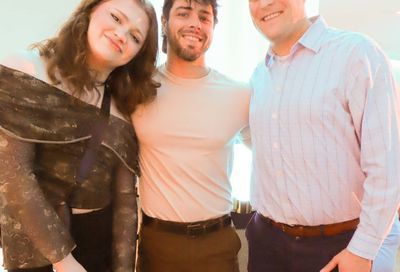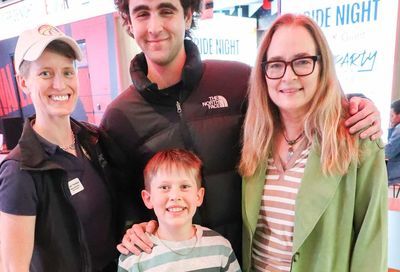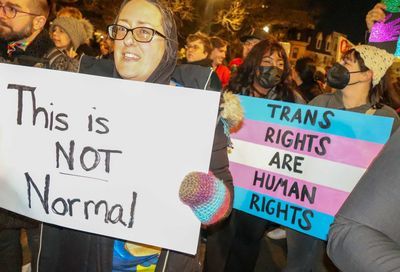The Fringe Appeal of It All
The annual Capital Fringe festival returns for its 16th edition with at least ten shows of LGBTQ interest.

Local queer creatives will come together this month for a “Queer Family Summer Sanctuary” as well as “a neo-futuristic musical celebration” — just two of at least ten LGBTQ-related productions on offer at this year’s Capital Fringe festival.
The interdisciplinary theater outfit RiverShe Collective Arts offers the Queer Family Summer Sanctuary, at which a diverse mix of artists, who identify across both the BIPOC and LGBTQ spectrums, will come together in a celebration of their “heart, art, and soul.”
Not to be outdone, the neo-futuristic musical crew, organized by Natalia Corvoisier and Courtney Simmons, presents a program featuring two short works of theater devised by an ensemble of BIPOC and LGBTQ artists — from the titular TBD, described as “a theatrical celebration born from an inclusive devising process with 15 plays performed in 30 minutes, in an order chosen by the audience,” to A Musical Love Letter, a song-and-dance showcase of “everything we love about theater and what artists love about life.”
The two productions epitomize one clear undercurrent running through many of the shows at this year’s festival: that of “examining, in some sort of way, our individual and collective identities,” says Julianne Brienza, founding artistic director of Capital Fringe, now staging its 16th annual festival.
“When I first started Fringe,” says Brienza, “it was really gay men only — that was the only sort-of signifier that was kind of okay to ask about. And then that changed. Now, I feel like people are being able to identify as they are in the full spectrum of who they are when they’re performing. It’s not so narrow anymore, which I think is positive.”

Brienza says it’s become harder to identify and assemble an LGBTQ-specific list from the full slate of festival offerings. “I don’t even know how to do that list anymore, because most people are queer,” Brienza notes.
That’s not the only way the festival has evolved over the years, particularly since COVID, which forced the festival’s cancellation in the years 2020 and 2021.
“Pre-COVID, there were always predominant themes that would bubble up. It was just the way it worked,” she says. “But last year and this year, we don’t really have that. And I think it’s because we have so many things happening on the planet, in our communities, in our families all at the same time.
“So really, the shows run the gamut of what our whole human experience is right now…. It’s really just people wanting to express themselves. So if people are curious about someone showing their authentic self, or exploring what it may be to be authentic, Fringe is a great place to do that this year.”
Similar to last year’s post-COVID return, a few vacant properties in Georgetown, graciously secured with the help of the Georgetown BID, play host to many of this year’s Capital Fringe productions. But this year’s festival also touches down at Cafritz Hall in the newly renovated Edlavitch DCJCC, courtesy of the organization’s Theater J.
“One of the things we really wanted to add back this year was shows that [featured] dance and that had multiple people in [the cast],” says Brienza. “It’s kind of hard to have enough room for all of that in vacant space.”
This year’s Capital Fringe also bolsters its slate of Free Fringe Creative Music programming, with curated concerts at venues including an outdoor “Parklet” and event space Powerhouse, which also serves as this year’s community bar space and meeting spot, and featuring artists spanning genres from country and bluegrass, to punk, to jazz and classical.
Ultimately, Brienza hopes the festival is as positive an experience this year as was last year’s post-COVID return, the success of which came as something of a surprise. “I didn’t know what to expect,” Brienza concedes, “because all I was hearing from regional theaters and people who had been doing [live] shows and stuff was that no one was coming back to the theater. But we sold 87 percent of available tickets, and our giveback to the artists…increased from 2019.”
Since its inception, Capital Fringe has granted all featured artists 70 percent of the total ticket revenue from their respective productions.

That financial boost is just one of several ways the festival has benefited many nascent and emerging theater companies over the past 18 years. “I would say close to all small- to mid-sized independent theater companies in the District of Columbia got their start at the Fringe Festival, or participated in the Fringe Festival in their early years.”
In recent years especially, the festival has served as a launching pad for “a lot of folks…who had never engaged in theater before,” giving them “a way to get started, a way to kick around ideas,” and also “a way to get people intrigued about theater,” thus helping “to create new patrons for theater in D.C., which is what we need to do.”
Despite that, though, Brienza says the future of Capital Fringe remains as precarious as ever. “We’re in a rough spot. We need the theater community to support us…. Nothing lasts forever, and it’s not a given that we’ll be back next year. It’s all depending upon how this year’s festival goes.”
The lineup of LGBTQ-related shows, in addition to the aforementioned Queer Family Summer Sanctuary and TBD, includes:
- Keys, Wallet, Phone, Dignity, a comedic one-person-show from Sheldon Scott that finds the local gay writer and performer sharing his struggles, as Brienza puts it, “to date during the pandemic and then afterwards.”
- Nasty White Folx…and other filth, a one-person examination of race and hygiene from Sidney Monroe Williams, officially described as a “mixed-media performance [that] fuses storytelling, ritual movement, and social media into a Black queer commentary on how we care for ourselves.”
- Brunch with the Boys, an original musical composed and directed by Sean Pflueger with a book by Michael Vegas Mussman, featuring an all-LGBT cast that is billed as “anything but bottomless, like a mimosa this story’s a little sour and a lot of sweet.”
- Quilt Stories: Voices from the AIDS Quilt, presented by the North Carolina-based Mouths of Babes Theatre Company as “a moving monologue play based on interviews from people who lost loved ones to the AIDS crisis” — derived from a few of the 50,000 panels from the iconic 54-ton AIDS Memorial Quilt.
- My Name is Norma, Erin Joy Schmidt’s one-person play offering a humorous and gritty look at the controversial Norma McCorvey, the now-deceased woman who was “Roe” in the landmark abortion case Roe v. Wade, an erstwhile lesbian who became a born-again “ex-gay” exploited by right-to-life activists.
- Bell Wringer from the local feminist theater organization Pinky Swear Productions, touted as “a brand new musical based on an old legend,” featuring a ragtag ensemble of actors performing a “totally 100 percent very made-up version of the Bell Witch legend,” accompanied by a bluegrass band.
- *Ten Principles )'( – A DC Burners Storytelling Project, offering “new and true tales told live by DC Burners, stories of dust and glory from the District to Black Rock City aka Burning Man.”
This year’s Capital Fringe Festival runs through Sunday, July 23. Tickets are $15, plus fees, per show. Visit www.capitalfringe.org for a full schedule, venue addresses, and more information.
Support Metro Weekly’s Journalism
These are challenging times for news organizations. And yet it’s crucial we stay active and provide vital resources and information to both our local readers and the world. So won’t you please take a moment and consider supporting Metro Weekly with a membership? For as little as $5 a month, you can help ensure Metro Weekly magazine and MetroWeekly.com remain free, viable resources as we provide the best, most diverse, culturally-resonant LGBTQ coverage in both the D.C. region and around the world. Memberships come with exclusive perks and discounts, your own personal digital delivery of each week’s magazine (and an archive), access to our Member's Lounge when it launches this fall, and exclusive members-only items like Metro Weekly Membership Mugs and Tote Bags! Check out all our membership levels here and please join us today!




















You must be logged in to post a comment.